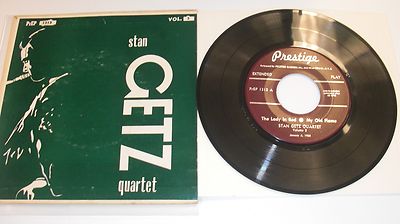Tad Richards' odyssey through the catalog of Prestige Records:an unofficial and idiosyncratic history of jazz in the 50s and 60s. With occasional digressions.
Friday, August 29, 2014
Listening to Prestige Records, part 26: Stan Getz
You know how when you hear a word you've never heard before, suddenly everyone seems to be using it -- seems like everyone else except you knew it all the time? Jimmy Hatlo even devoted one of his "They'll Do It Every Time" cartoons to this theme, so thanx and a tip of the Hatlo hat, Jimmy, and it's happening to me with musicians instead of words. No sooner do I mention never having heard of Tony Aless than he shows up again, this time as part of a Stan Getz Quartet.
Perhaps there's something to be said for the theory that a jazz recording session is quite likely to involve a group made up of whoever's around. Tony Aless and Don Lamond had both played on the Chubby Jackson session a month earlier and so were quite likely still kicking around 52nd Street. And Getz would have known them because they were both -- as were so many early Prestige artists -- Woody Herman veterans.
Percy Heath has a credit that I'd venture to guess no other jazzman has: he was a member of the Tuskegee Airmen, the famed African-American military aviators of World War II. He has impressive jazz credits, too, including being a member, with his brothers, of one of the first families of jazz.
One of the joys that the great balladeers like Stan Getz bring to jazz is their way with classic songs from what has come to be known as the Great American Songbook. These are vivid and memorable melodies, with chord changes and melodic structures that lend themselves to jazz interpretation and improvisation.
But they're more than that. They're songs, with the emotional and thematic power that only a song can deliver. Lester Young said that he always heard the words to a song in his head as he played it. The fictional Dale Turner, played by Dexter Gordon in the movie "Round Midnight," has a moment when he realizes he's losing his ability to produce the music he wants to, and says, "I forgot the words." I don't know if Stan Getz played the words in his head when he recorded a ballad, but he captures the feeling of each of these.
Of course, music is abstract. If you didn't know the story of Peter and the Wolf, you wouldn't just be able to conjure up ducks and wolves and hunters from the music itself. But if you know the songs, Getz brings something palpable to them.
In "You Stepped Out of a Dream," that rapt wonder that only the person you've suddenly, unreservedly fallen in love with can evoke. Written by Nacio Herb Brown and Gus Kahn, it was originally sung by Tony Martin for the 1941 musical Ziegfeld Girl, to the visual of Lana Turner descending a staircase. Brown isn't quite on the Olympus of American songwriters, but he was good enough to dream, and good enough to write some melodies that are remembered.
"My Old Flame" is a song that was brilliantly subverted and destroyed by Spike Jones. It was written by Arthur Johnston and Sam Coslow, who also saw their other hit, "Cocktails for Two," similarly demolished by Spike Jones. So Getz is not going her for the A-list of American composers, but he's finding some fine melodies, and in this case, restoring the feeling that Johnston and Coslow must have meant it to have: sweet nostalgia, regret.
I didn't know "The Lady in Red," so I listened to the Mark Murphy version and the Louis Prima version. I missed the Bugs Bunny version, "The Rabbit in Red," so I guess this was an eminently wreckable song too -- and again by a good, but B-list composer, Allie Wrubel. And this one bright, vivacious, sparkling. All these not-quite-great songwriters taken over the top, into immortality, by a true great, Stan Getz.
"Wrap Your Troubles in Dreams," by songwriters I really hadn't heard of - Harry Barris, Ted Koehler, Billy Moll. Getz captures the dreamy optimism that comes out sadness. You wouldn't have to wrap your troubles in dreams and dream your troubles away if you didn't have troubles.
All these songs are about loss, and about an at best evanescent reality. Losses that you have to dream away, but you never really can. The fading memory of an old flame. The girl who steps out of a dream -- she's Lana Turner, and you'll never have her. She'll never really detach from that dream. Even the vivacious, snazzy lady in red -- you'll never have her either.
Stan Getz was a poet of loss, right up to that girl walking across the beach, looking straight ahead, not at you.
Released on Prestige and New Jazz 78s and 10-inchers, Prestige EP, even a 45 (My Old Flame/The Lady in Red), and later on a 7000-series reissue, a 24000-series double LP, even on an New Jazz LP when that line was briefly restarted.
Subscribe to:
Post Comments (Atom)



No comments:
Post a Comment